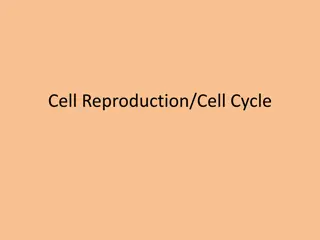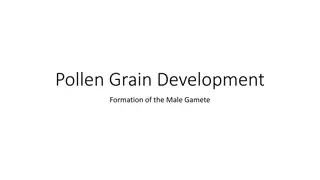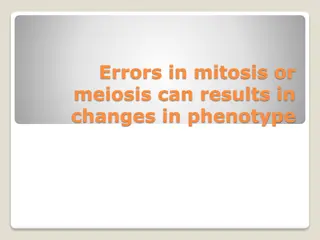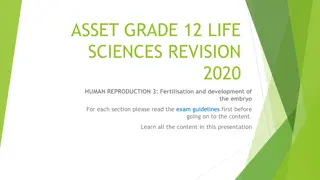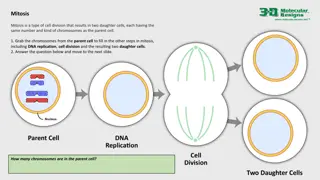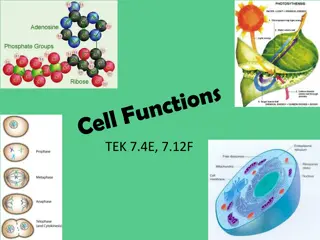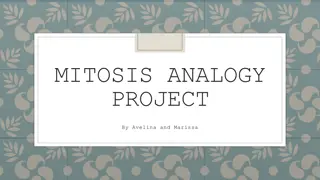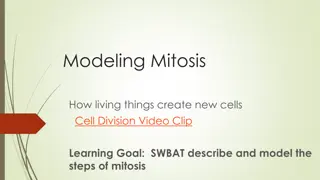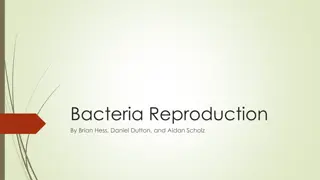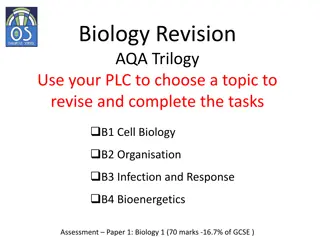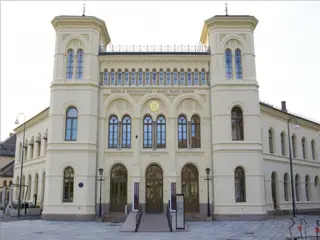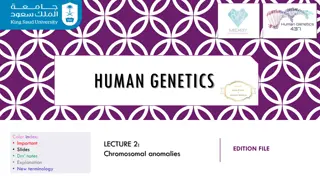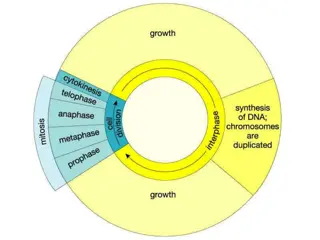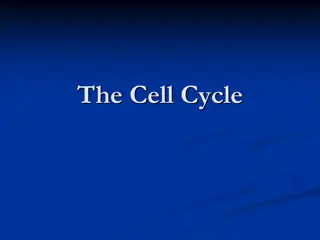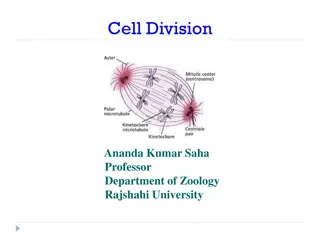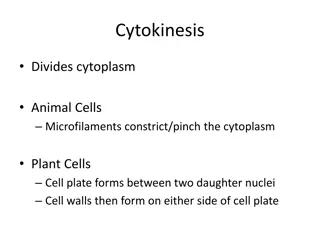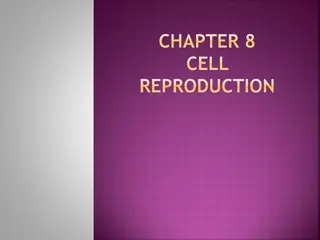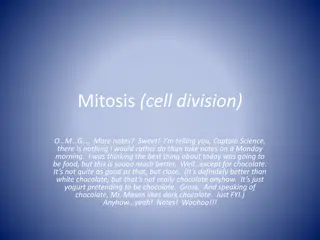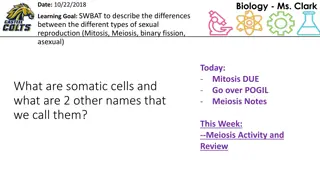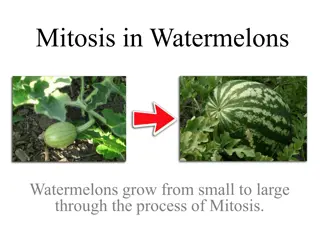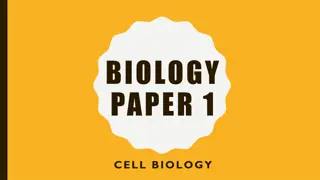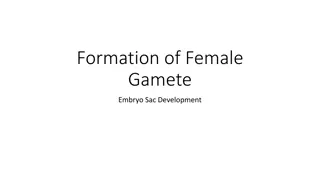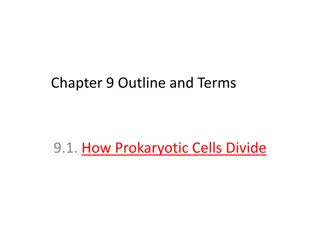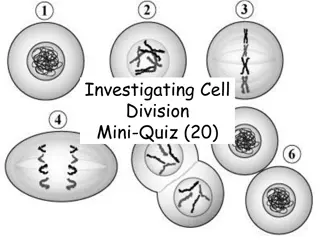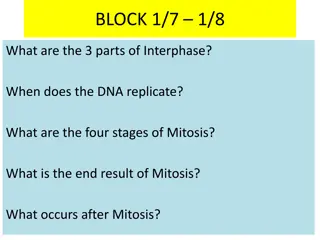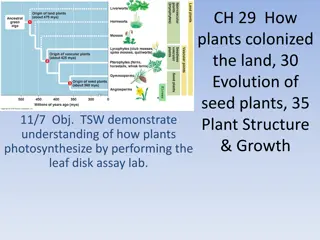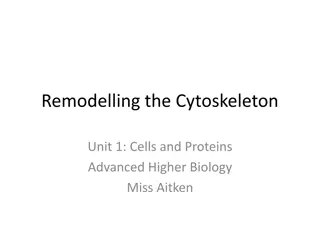Understanding Cell Reproduction and the Cell Cycle
Explore the process of cell reproduction, DNA structure, chromosomes, and the differences between prokaryotic and eukaryotic cell cycles. Learn about binary fission, mitosis, and cytokinesis in the context of cellular growth and division. Understand the significance of genes, DNA organization into c
5 views • 56 slides
Regulation of Cdc14 Activity in Budding Yeast during Anaphase
The FEAR (Cdc14 early anaphase release) network and the MEN (mitotic exit) network play vital roles in controlling Cdc14 activity in budding yeast during anaphase. These networks regulate Cdc14 through its association with the inhibitor Net1 (Cfi1) and facilitate Cdc14 activation through sequential
4 views • 17 slides
Pollen Grain Development
The process of pollen grain development and formation of the male gamete involves crucial stages such as the presence of diploid microspore mother cells in the stamen, meiosis resulting in the formation of four haploid cells and tetrads, mitosis leading to the development of two haploid nuclei in ea
0 views • 6 slides
Chromosomal Alterations and Their Impact on Phenotype
Errors in mitosis or meiosis can result in changes in phenotype, often due to alterations in chromosome structure such as deletion, duplication, inversion, and translocation. Nondisjunction can lead to abnormal chromosome number, resulting in disorders like aneuploidy. Polyploidy, with extra complet
0 views • 9 slides
Human Reproduction: Fertilisation and Embryo Development Overview
Human reproduction involves the complex processes of fertilisation and embryo development. Fertilisation occurs when the nucleus of a sperm cell fuses with the nucleus of an ovum to form a zygote. The zygote undergoes mitosis to develop into a blastocyst, which then implants into the endometrium. Th
0 views • 12 slides
Cell Division Processes: Mitosis and Meiosis Explained
Mitosis and meiosis are two types of cell division processes with distinct outcomes in terms of chromosome numbers. Mitosis results in two daughter cells with the same number of chromosomes as the parent cell, while meiosis produces four gamete cells with half the chromosome number. This explanation
2 views • 5 slides
Exploring Cell Biology: Functions, Metabolism, and Division
Delve into the fascinating world of cell biology, where you'll learn about the diverse functions of cells in different organisms, the essential role of metabolism in providing energy, and the intricate processes of cell division such as mitosis. Discover how cells conduct nerve impulses, produce red
0 views • 11 slides
Understanding Mitosis: An Analogy Project Explained
Mitosis is the cell duplication process consisting of five stages - Prophase, Metaphase, Anaphase, and Telophase (PMAT). This analogy project by Avelina and Marissa creatively compares mitosis to a Physical Education class activity, making the complex scientific concept easy to grasp. The stages of
0 views • 5 slides
Understanding Mitosis Through a Hands-On Modeling Activity
Explore the process of mitosis by engaging in a hands-on activity using gummy worms, toothpicks, and twizzlers to represent chromosomes, centromeres, and spindle fibers. Through a series of steps starting from Interphase, participants will replicate the stages of cell division, gaining a deeper unde
0 views • 22 slides
Insights into Bacteria Reproduction and Cell Division
Explore the fascinating world of bacteria reproduction through binary fission, conjugation, and mitosis. Uncover the similarities and unique aspects of prokaryotic and eukaryotic cell division processes. Learn how conjugation plays a vital role in transferring genetic information between bacteria ce
0 views • 21 slides
Biology Revision with AQA Trilogy: Cell Biology and Organism Organization
In this biology revision session for AQA Trilogy, we delve into topics like cell biology, organism organization, diffusion, osmosis, active transport, enzymes, and more. Explore the differences between prokaryotes and eukaryotes, understand cell specialization, and learn about key processes like mit
0 views • 8 slides
Understanding Cell Growth and Reproduction: A Comprehensive Overview
Explore the intricate process of cell division through stages like Interphase, Mitosis, and Cytokinesis. Learn about the crucial phases such as Prophase, Metaphase, and Anaphase, each playing a significant role in the reproduction of cells. Understand the purpose and importance of the cell cycle in
0 views • 44 slides
Understanding Chromosomes: Key Components, Functions, and Significance
Chromosomes, essential in mitosis and meiosis, are condensed forms of DNA vital for heredity, mutation, and evolution. Learn about their structure, role in inheritance, and impact on species development through historical discoveries. Discover the importance of chromosome sets and genomes in gametic
0 views • 38 slides
Understanding Chromosomal Anomalies in Human Genetics
This lecture covers essential topics in human genetics, focusing on mitosis, meiosis, and chromosomal abnormalities. Students will learn about the events in mitosis and meiosis, non-disjunction, and classification of chromosomal anomalies, including numerical and structural abnormalities. Detailed e
1 views • 22 slides
Biology Review: Genetics, Enzymes, and Cell Division
Explore key concepts in AP Biology, including genetic continuity and change, enzyme catalysis, mitosis, and meiosis. Understand the mechanisms of genetic variability and cell division processes. Dive into enzyme-substrate interactions and the differences between mitosis and meiosis.
0 views • 11 slides
Understanding Meiosis: Vocabulary, Notes, and Key Similarities with Mitosis
Explore the vocabulary and key concepts related to meiosis, including terms like homologous chromosomes, diploid, and haploid. Learn about the process of meiosis, its stages, and the similarities and differences between meiosis and mitosis. Check your understanding of chromosome numbers and crossing
0 views • 21 slides
Understanding the Cell Cycle and Mitosis Process
The cell cycle consists of two main periods: Interphase and Mitosis. During Interphase, the cell prepares for division by growing in size and copying chromosomes. Mitosis, the division of the nucleus, results in the formation of two daughter cells with identical chromosome copies. Centrioles and cen
0 views • 26 slides
Understanding the Cell Cycle: Growth, Division, and Reproduction
The cell cycle is a fundamental process that allows cells to grow, divide, and reproduce, essential for growth, repair, and maintaining the balance of our bodies. It consists of stages like interphase, mitosis, and cytokinesis, each with distinct functions. Interphase is a period of growth and devel
0 views • 28 slides
Understanding Cell Division: Processes and Types
Cell division is a vital process in living cells for growth and reproduction. This article explores the basics of cell division, including the cell cycle, types of cell division (such as mitosis and meiosis), and the initiation of cell division. It also covers key phases like interphase and provides
0 views • 20 slides
Overview of Cell Division Processes: Mitosis and Meiosis
Cell division involves two main processes: mitosis and meiosis. Mitosis is responsible for the division of somatic cells, producing identical daughter cells. It consists of prophase, metaphase, anaphase, and telophase, followed by cytokinesis. In contrast, meiosis is crucial for the formation of gam
4 views • 37 slides
Understanding Mitosis: Cell Division Explained
Mitosis is the process of cell division crucial for growth and repair in living organisms. It consists of stages like Interphase, Prophase, Metaphase, Anaphase, and Telophase. Each stage plays a vital role in ensuring accurate replication and distribution of genetic material. Visualization of chromo
0 views • 5 slides
Understanding Cell Reproduction: Chromosomes, Cell Cycle, and Division
Explore the fascinating world of cell reproduction, from the structure of chromosomes and the role of histones to the process of mitosis and meiosis. Learn about diploid and haploid cells, the significance of homologous chromosomes, and the stages of the cell cycle. Discover how different types of c
0 views • 14 slides
Comprehensive Notes on Mitosis and Cell Division Process
Exploring the fascinating world of mitosis and cell division, this extensive collection of notes covers topics such as why cells need to divide, the cell cycle, interphase phases (G1, S, G2), and the essential process of mitosis in somatic cells. Supported by vivid images, the content delves into th
0 views • 21 slides
Biology Class Learning Goals and Activities with Ms. Clark
Ms. Clark's biology class focuses on understanding the differences between types of sexual reproduction such as mitosis, meiosis, binary fission, and asexual reproduction. Students learn about somatic cells, genetic variation in meiosis, DNA, genes, and chromosomes. Activities include notes, videos,
0 views • 4 slides
The Process of Mitosis and Meiosis in Watermelons
Watermelons undergo the processes of mitosis and meiosis to grow and reproduce. During mitosis, watermelons develop through interphase, prophase, metaphase, anaphase, and telophase. In meiosis, seeded watermelons produce gametes through prophase I, metaphase I, anaphase I, and telophase I. Both proc
0 views • 16 slides
Cell Biology Overview and Organ Systems in Biology Paper 1
The Biology Paper 1 content covers topics such as cell specializations, cell division, organelles, enzyme functions, and organ systems including the cardiovascular system. It discusses key concepts like stem cells, mitosis, diffusion, osmosis, active transport, and various cell components such as nu
0 views • 8 slides
Development of Female Gamete and Embryo Sac in Plant Reproduction
In plant reproduction, the formation of female gametes involves meiosis in cells of the carpel sac, leading to the development of the embryo sac or megaspore. Meiosis results in four haploid cells, of which three degenerate, and one survives. This surviving cell undergoes multiple rounds of mitosis,
0 views • 7 slides
Cell Division Mechanisms in Prokaryotic and Eukaryotic Cells
Prokaryotic cells divide through binary fission, while eukaryotic cells undergo mitosis with nuclear division and cytokinesis. Prokaryotic cells lack a nucleus and divide by replicating DNA and forming two identical daughter cells. Eukaryotic chromosomes, associated with histone proteins, undergo co
0 views • 56 slides
Investigating Cell Division Mini-Quiz - Learn About Cell Biology
Explore the world of cell division through a mini-quiz covering topics such as the importance of cell division, chromosome structure, mitosis, and more. Test your knowledge and enhance your understanding of cellular processes.
0 views • 41 slides
Understanding Cell Reproduction and Mitosis in Living Organisms
Living organisms go through a life cycle that involves cell reproduction. This process includes mitosis, where the nucleus divides to form two identical nuclei. The stages of mitosis - interphase, prophase, metaphase, anaphase, telophase, and cytokinesis - are essential for growth, repair, and repla
0 views • 12 slides
A Comprehensive Comparison of Mitosis, Meiosis, and Cellular Processes in Cells
Explore the intricate processes of mitosis and meiosis, delving into how cells divide and reproduce, as well as the vital functions of cellular respiration and photosynthesis. Learn about DNA, chromosomes, and the phases of mitosis. Discover the key differences between mitosis and meiosis in cell di
0 views • 22 slides
Genetics and Cell Division Study Guide
Explore topics ranging from cell division phases, mitosis stages, genetic variation in sexual reproduction, chromosome structures, karyotypes, Mendel's laws, Punnett squares, and more in this comprehensive study guide. Understand key concepts such as DNA replication, chromosomal abnormalities, gamet
0 views • 46 slides
Understanding Plant Evolution and Characteristics
Plants colonized land through various adaptations such as multicellularity and photosynthesis. They exhibit characteristics like chlorophyll, cellulose cell walls, and apical meristems. Plant evolution includes alternation of generations, with gametophytes and sporophytes undergoing meiosis and mito
0 views • 15 slides
Understanding Genetics: Concepts of Heredity, Mitosis, Meiosis, and DNA
Genetics is the study of heredity and genetic variations, involving terms like genotype, phenotype, homozygous, heterozygous, dominant, and recessive. Mitosis and meiosis are key processes in cell division, each with specific phases and functions. DNA, or Deoxyribonucleic Acid, stores and transmits
0 views • 14 slides
Exploring the Intricacies of Mitosis, Neurons, and Endocrine System
Delve into the world of biology and neuroscience with detailed images depicting mitosis, chromatids, equator, spindle fibres, diploid and haploid cells. Explore the journey from stem cells to tissues and organs, including the Central Nervous System (CNS) components like cerebellum, cerebrum, and med
0 views • 72 slides
Understanding the Role of Microtubules in Cell Remodeling
The cytoskeleton, a network of fibers made from proteins, plays a crucial role in maintaining cell structure and shape. Microtubules, which are hollow straight rods made from tubulin proteins, control the movement of membrane-bound organelles and cell components. During cell division, microtubules a
0 views • 8 slides
